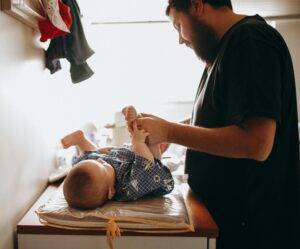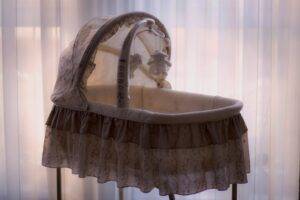Welcoming a newborn into your family is a joyful and life-changing event. As first-time parents, it’s natural to feel excitement and apprehension. To help you navigate this new journey, we’ve created a comprehensive newborn baby to-do list.
This newborn baby to-do list covers ten essential tasks to prepare for your little one’s arrival and the early days of parenthood.
1. Set Up the Nursery
Creating a safe, comfortable, and functional nursery is a top priority. Your newborn baby to-do list should start with setting up a space for the items below. Ensure the room is free of hazards and has a cozy atmosphere. Consider blackout curtains for better sleep.
- Crib: Make sure it meets current safety standards.
- Changing Table: A dedicated space for diaper changes.
- Storage: Bins or drawers for clothes, diapers, and toys.
- Rocking Chair: For soothing and feeding.
Creating a serene and functional nursery environment helps you and your baby feel more at ease. A safe crib ensures your baby sleeps soundly, while a well-organized changing table makes diaper changes smoother. Having ample storage, you keep the nursery clutter-free and a peaceful atmosphere.
The rocking chair provides comfort during feeding and soothing sessions, strengthening your bond with your baby. Setting up the nursery involves more than just furniture, make a few personal touches to make it special. Also, think about the overall room ambiance.
Soft lighting is essential for nighttime feedings and diaper changes, so consider installing a dimmer switch or using lamps with soft, warm light. Decorations add a personal touch, but ensure they’re safe and not within the baby’s reach. Gentle colors with a few elements like wall art or a mobile enhance the room’s ambiance.
This space will be where many of your first memories with your baby are made, so creating a warm and welcoming environment is key. To know more about decorating your nursery, this post might interest you: Nursery Design Ideas: Creating the Perfect Space for Your Newborn.

Safety First
- Crib Safety: The crib should be sturdy with slats no more than 2 3/8 inches apart.
- Changing Table Safety: Always use the safety strap and never leave your baby unattended.
- Room Temperature: Keep the nursery between 68-72°F (20-22°C) for optimal comfort.
2. Stock Up on Baby Essentials
Before your baby arrives, stock up on essential items such as the following:
- Diapers and Wipes: A variety of diaper sizes since newborns grow fast. A supply for at least the first few weeks.
- Baby Clothes: Onesies, sleepers, and socks.
- Toiletries: Baby shampoo, lotion, diaper cream.
- First-Aid Kit: Thermometer, baby nail clippers, and infant acetaminophen.
Prepare these items for daily care tasks, such as diaper changes and dressing your baby. Newborns go through many diapers, so having a well-stocked supply prevents last-minute trips to the store. Additionally, having a first-aid kit with baby-specific items allows you to address minor health concerns quickly.
When selecting baby clothes, choose soft, breathable fabrics that are easy to put on and take off and keep your newborn comfortable. Look for onesies with easy snap closures for quick diaper changes. Additionally, baby mittens can prevent your baby from scratching their delicate skin.
Newborns have sensitive skin, so gentle materials prevent irritation. Also, consider the weather and choose appropriate clothing to keep your baby comfortable. Having a range of clothing options ensures you are prepared for any situation.

Additional Items to Consider
- Swaddle Blankets: Help your baby feel secure and sleep better.
- Diaper Bag: Pack it with essentials for outings.
- Bottle Warmer: Convenient for warming milk or formula.
3. Choose a Pediatrician
Selecting a pediatrician before your baby is born is crucial. Research and visit potential pediatricians to find someone you trust and feel comfortable with. Consider their approach to newborn care, and recommendations from other parents, and also the following factors:
- Location: Proximity to your home for convenience.
- Credentials: Board certification and experience with newborns.
- Availability: Office hours and after-hours care.
Having a pediatrician you trust gives you peace of mind, knowing that your baby’s health is in good hands. During the first year, you will have frequent visits to monitor your baby’s growth and development, so a convenient location is essential.
Understanding the pediatrician’s approach to care ensures that their philosophy aligns with your parenting style. It’s also helpful to inquire about the pediatrician’s communication methods. Some doctors offer virtual consultations or have nurse lines you can call with questions.
Understanding how accessible your pediatrician will be makes a difference in how supported you feel as a new parent. It’s best to meet with a few pediatricians before making your decision. Prepare a list of questions about their practice, such as their views on vaccinations, office policies, and how they handle emergencies.
This will help you gauge their compatibility with your parenting style and expectations.
4. Learn About Feeding
Decide whether you will breastfeed or formula feed, and gather supplies for either method. Consider these feeding essentials in your newborn baby to-do list:
- Breastfeeding: Nursing bras, breast pump, and storage bags.
- Formula Feeding: Formula, bottles, and sterilizing equipment.
- Burp Cloths: Feeding sessions to keep you and the baby clean.
Understanding the basics of feeding your newborn ensures your baby gets the nutrition they need to thrive. If you choose to breastfeed, establish a good latch and feeding routine. A lactation consultant offers invaluable support and advice, helping you navigate challenges.
The right supplies, such as nursing bras and a breast pump, make the experience more comfortable and efficient. For formula feeding, select the right formula and the necessary equipment. Ensure you have enough bottles and a reliable method for sterilizing them to maintain hygiene.
Burp cloths keep you and your baby clean during and after feeding sessions. Regardless of the method, create a calm and comfortable feeding environment. Whether it’s a quiet corner in the nursery or a cozy spot in your living room, having a dedicated space makes feeding times more enjoyable for you and your baby.
5. Prepare for Sleep
Newborns sleep a lot but in short stretches. Consider these preparation tips in your newborn baby to-do list:
- Sleep Environment: Quiet, dark, and cool room.
- Routine: Establish a bedtime routine with calming activities.
- Safety: Follow safe sleep guidelines to reduce the risk of SIDS (Sudden Infant Death Syndrome).
Your baby should have a safe and comfortable sleep environment for their well-being. A firm crib mattress provides support while keeping the crib free of pillows, blankets, and toys reducing the risk of suffocation. Create a quiet, dark, and cool room to help your baby settle more easily and sleep more soundly.
Establishing a bedtime routine with calming activities, such as a warm bath, gentle rocking, or reading a book, signals your baby that it’s time to sleep. Be consistent since it helps your baby understand what to expect, making it easier for them to transition to sleep.
Follow safe sleep guidelines to reduce the risk of SIDS. Placing your baby on their back to sleep and avoiding soft bedding are critical steps in ensuring their safety. By prioritizing sleep preparation, you help your baby develop healthy sleep habits that benefit the entire family.
6. Plan for Babyproofing
It’s never too early to start babyproofing your home while your newborn isn’t mobile yet. Here are some babyproofing basics for your newborn baby to-do list.
- Furniture: Anchor heavy furniture to the walls.
- Electrical Outlets: Use safety covers.
- Small Objects: Keep them out of reach as they could be choking hazards.
Babyproofing your home creates a safe environment for your baby as they begin to explore. Prepare your home in advance even though your newborn won’t be crawling, walking, or mobile yet. Secure heavy furniture to the walls prevents tipping accidents while covering electrical outlets reduces the risk of electrical shocks.
Removing small objects from your baby’s reach helps prevent choking hazards. As your baby grows and becomes more curious, having a babyproofed home gives you peace of mind, and safety to explore their surroundings. Regularly check your home for potential hazards and adjust to maintain a safe environment.
7. Assemble a Support Network
Having a support network is invaluable for first-time parents. Don’t hesitate to ask for help when you need it.
- Family and Friends: Enlist their help for meals and errands.
- Professional Support: Lactation consultants, pediatricians, and therapists.
- Parenting Groups: Join local or online groups for advice and support.
A strong support network provides emotional and practical assistance, helping you navigate the challenges of parenthood. Family and friends offer help with meals, errands, and household chores, giving you more time to focus on your baby. Accepting offers of assistance alleviates some of the pressures of new parenthood.
Professional support, such as lactation consultants and pediatricians, offers expert advice and guidance. They help address concerns about your baby’s health and development, providing reassurance and support.
Joining parenting groups, either locally or online, connects you with other parents who are going through similar experiences. These groups offer valuable insights, advice, and a sense of community.
8. Take Care of Legalities
Ensure all necessary legalities. Here’s a checklist for your newborn baby to-do list:
- Birth Registration: Obtain a birth certificate.
- Social Security Number: Apply through the hospital or local Social Security office.
- Will and Life Insurance: Update to include your baby.
Taking care of legal matters ensures your baby is properly documented and protected. Registering your baby’s birth and obtaining a birth certificate is essential for their legal identity. Applying for a Social Security number allows you to add your baby to your health insurance and claim them as a dependent on your taxes.
Updating your will and life insurance policies to include your new family member ensures their financial security in an emergency. Consider designating a guardian for your baby in your will, providing peace of mind that they will be cared for according to your wishes.
9. Prepare for Postpartum Care
Taking care of yourself is just as important as your newborn. Have a plan for postpartum care. Recognize the signs of postpartum depression and seek help if needed. Here are tips for your newborn baby to-do list:
- Rest: Sleep when the baby sleeps.
- Nutrition: Eat balanced meals and stay hydrated.
- Mental Health: Talk to a healthcare provider about your feelings.
Postpartum care is crucial for your recovery and well-being. Ensuring you get enough rest can be challenging with a newborn, but taking naps when your baby sleeps helps. Proper nutrition and hydration support your body’s healing process and provide the energy needed to care for your baby.
Mental health is an important aspect of postpartum care. It’s normal to experience a range of emotions after giving birth, but if you feel overwhelmed or notice signs of postpartum depression, seek help from a healthcare provider.
Check out this article for further insights: Recognize the Signs: Understanding Postpartum Depression and Anxiety Symptoms for New Moms
10. Learn Infant CPR
Knowing how to perform infant CPR can be lifesaving in an emergency. Here are your preparations to include in your newborn baby to-do list:
- Class: Enroll in an infant CPR course.
- Practice: Regularly review and practice the techniques.
- Resources: Keep a CPR guide accessible in your home.
Learning infant CPR equips you with the skills to handle emergencies confidently. Enroll in infant CPR to learn the correct techniques. Regularly reviewing and practicing these techniques keeps them fresh in your mind, so you’re prepared to act quickly if needed.
Keeping a CPR guide accessible in your home serves as a helpful reference. Knowing you have the knowledge and resources to handle an emergency provides peace of mind and enhances your overall preparedness as a parent.
Have a Well-Prepared Newborn Baby To-Do List
Navigating the early days of parenthood can be overwhelming, but with a well-prepared newborn baby to-do list, you ease some of the stress and focus on enjoying this special time with your baby. These ten essential tasks will help prepare for the exciting journey ahead. It’s fine to ask for help and take things one step at a time.
Welcome to the wonderful world of parenthood! Follow this comprehensive newborn baby to-do list and be well-prepared to welcome your little one to the world.






